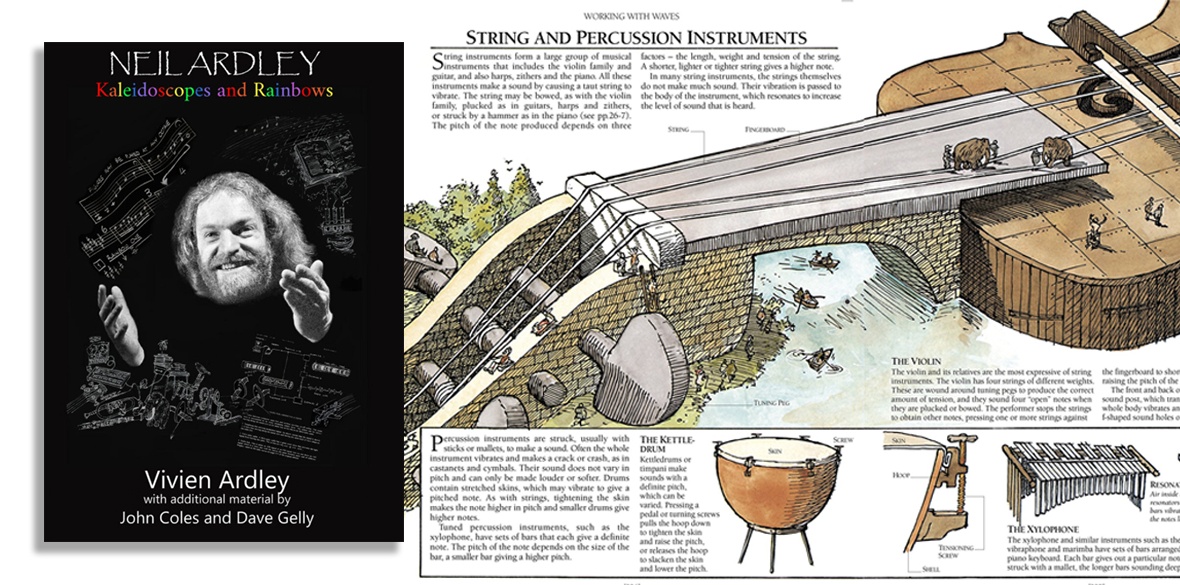This is the last article you can read this month
You can read more article this month
You can read more articles this month
Sorry your limit is up for this month
Reset on:
Please help support the Morning Star by subscribing here
Neil Ardley: Kaleidoscopes and Rainbows,
Vivien Ardley, Jazz in Britain Books, £19.99
VIVIEN ARDLEY’s biography of her protean writer-musician husband, Neil, is just about as full as any biography could be.
Sometimes you feel you are delving through a personal archive of this grammar-school boy from Wallington, Surrey, so detailed is this life-story and so full of documentation and illustrations from his books, family photographs, press packs and reviews of his records, letters, transcripts of radio broadcasts, discographies, blurbs and lists and reproduced pages from his copious books — here is the virtual entirety of an author/musician, fully setting down the features and details of a multifaceted life.
I know Ardley mostly as a brilliant orchestrator, jazz composer and arranger, an English “pastoral” artist closest in his musical inventiveness to the great Gil Evans, orchestral partner of Miles Davis.
Yet he also wrote a century of books, many of them — like 101 Great Science Experiments, remarkable in their capacity to lucidly explain complicated scientific processes difficult for young and untrained minds to fathom and understand.
He was in a sense a Paulo Freire of the sciences, and his crucial book The Way Things Work, in which he demystified the principles of science and technology through comical stories of a curious mammoth, sold millions of copies.
Yet Ardley kept his writing separate from his music, using the former to finance his explorations into the latter.
His first applauded music venture was when in 1964 he met a leaderless band searching for a composer/arranger, which under his leadership became the New Jazz Orchestra, and during its life included some of Britain’s greatest improvising musicians — from saxophonists Trevor Watts, Barbara Thompson and Don Rendell, to trombonist Paul Rutherford to trumpeters Kenny Wheeler, Henry Lowther and Harry Beckett, pianist Michael Garrick and bassist Barry Guy.
Ardley went on to combine jazz and Shakespeare (like Duke Ellington in his Such Sweet Thunder suite) in Will Power (1974) and to create a succession of admired albums culminating in Kaleidoscope of Rainbows, based on the five note gamela suite of Bali.
“It’s superb!” wrote Sunday Times critic and biographer of Ellington Derek Jewell; “it’s barrier-breaking, life-enhancing music.”
Ardley was a pioneer too of electronic instrumentation which he developed in his home studio in the Peak District.
The biography includes two CDs: one which features his electronic works played by his ensemble Zyklus, and an especially beautiful live recording of the Danish Radio Big Band, playing some of his most powerful arrangements.
On hand are brilliant soloists like trumpeters Palle Mikkelborg and Allan Botchinsky on Ardley’s Debussy-inspired Le Dejeuner Sur L’Herbe, and a stirring version of the Weill/Brecht Surabaya Johnny, with the plunging undertow of one of jazz’s greatest bassists, Niels-Henning Orsted Pedersen.
So there is a feast of music to listen to while you read.
That such a complex and eclectic musical brain could also simultaneously write a series of children’s books called The World of Tomorrow, which sought to decipher and elucidate in the simplest possible ways “levers to lasers, windmills to websites,” is an exemplary human mix well worth reading about through the challenges and travails of a close to exemplary intellectual life.
Yet this is a sometimes intimate biographical portrait, and although details of parts of Ardley’s musical life are closely described by co-authors Dave Gelly and John Coles, Vivien Ardley’s narrative is about a man of musical and scientific passion who never stopped working, inventing, composing, writing and explicating night and day, day and night with the constant support and cooperation of Bridget, his first wife.
As a reader and listener, you wonder and marvel most about the constancy of his creative energy and insight. But he managed it, did it, and has left a powerful and inspiring mark in sound and word on our times.









